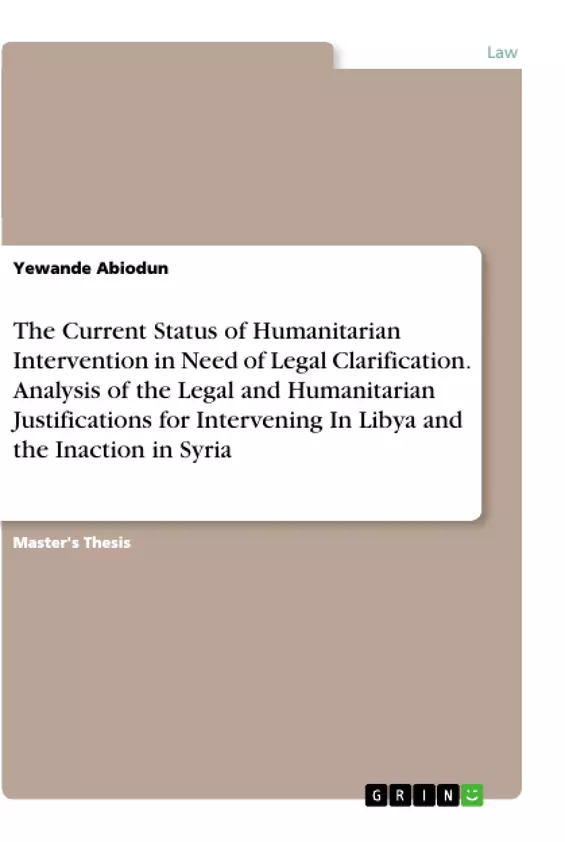In this thesis, the concepts of Sovereignty, non-intervention and Humanitarian Intervention will gradually be unveiled, especially in subsequent chapters. The cases of Syria and Libya will serve as watershed for the theoretically unveiled concepts.
The principle of State Sovereignty plays a great role in the formation of international law as it sets a basic foundation on which the international society is built. The natural supposition is that international order is best maintained if states respect one another’s sovereignty by adhering to the norms of non-intervention in the internal affairs of other states. The modern idea of Sovereignty dates back to Ancient Rome in which all sovereign powers were bestowed on the Emperor. It was deemed an absolute, unified, inalienable power based upon a voluntary but irrevocable contract.
Inhaltsverzeichnis (Table of Contents)
- CHAPTER ONE: STATE SOVEREIGNTY AND THE PRINCIPLE OF NON-INTERVENTION
- LAW ON THE USE OF FORCE
- AUTHORIZATION BY THE UN SECURITY COUNCIL
- THE CONCEPT OF HUMANITARIAN INTERVENTION
- HISTORICAL EVOLUTION OF HUMANITARIAN INTERVENTION
- HUMANITARIAN INTERVENTION UNDER CUSTOMARY INTERNATIONAL LAW
- HUMANITARIAN INTERVENTION UNDER THE UNITED NATIONS CHARTER
- CHAPTER TWO: LEGAL JUSTIFICATION FOR HUMANITARIAN INTERVENTION UNDER THE UNITED NATIONS CHARTER
- TEXTUAL ARGUMENTS
- CLASSICISTS VIEW
- NON-RESTRICTIONISTS VIEW
- THE EMERGENCE OF RESPONSIBILITY TO PROTECT
- CHAPTER THREE: REACTION OF THE INTERNATIONAL COMMUNITY TOWARDS INTERVENTION
- THE PROBLEM WITH UNILATERAL AND REGIONAL HUMANITARIAN INTERVENTION
- CASE STUDIES OF HUMANITARIAN INTERVENTIONS
- KOSOVO
- SOMALIA AND RWANDA
- BOSNIA
- PANAMA
- LIBERIA
- LIBYA AND SYRIA: TWO DIFFERENT CASES?
- CHAPTER FOUR: MORAL JUSTIFICATION FOR HUMANITARIAN INTERVENTION
- HUMANITARIAN INTERVENTION: A NEW PARADIGM; THE WAY FORWARD
- OBSERVATIONS AND PROPOSALS FOR SUCCESSFUL IMPLEMENTATION OF HUMANITARIAN INTERVENTION
Zielsetzung und Themenschwerpunkte (Objectives and Key Themes)
This thesis explores the legal and humanitarian justifications for intervention in situations of humanitarian crises, using the case studies of Libya and Syria to illustrate the complexities and challenges of applying international law in practice. The work aims to provide a comprehensive analysis of the legal framework surrounding humanitarian intervention, while also addressing the moral and ethical considerations involved.
- State sovereignty and the principle of non-intervention
- Legal justifications for humanitarian intervention under the UN Charter
- The role of the international community in responding to humanitarian crises
- Comparative analysis of intervention in Libya and Syria
- Moral justifications for humanitarian intervention and the 'responsibility to protect' principle.
Zusammenfassung der Kapitel (Chapter Summaries)
Chapter One examines the legal framework governing state sovereignty and the principle of non-intervention, including the legal basis for the use of force and the role of the UN Security Council. It traces the historical evolution of humanitarian intervention and analyzes its legal foundation under both customary international law and the UN Charter. Chapter Two delves into the legal justifications for humanitarian intervention under the UN Charter, examining textual arguments, contrasting the views of classicists and non-restrictionists, and exploring the emergence of the 'Responsibility to Protect' principle. Chapter Three analyzes the international community's response to humanitarian intervention, focusing on the challenges of unilateral and regional intervention and providing case studies of interventions in Kosovo, Somalia and Rwanda, Bosnia, Panama, Liberia, and a comparative analysis of Libya and Syria. Chapter Four addresses the moral justification for humanitarian intervention, exploring the potential for a new paradigm for intervention and outlining observations and proposals for the successful implementation of humanitarian intervention.
Schlüsselwörter (Keywords)
The primary focus of this thesis lies on the legal and humanitarian justifications for intervention, specifically exploring the concepts of state sovereignty, non-intervention, humanitarian intervention, the 'Responsibility to Protect' principle, and the United Nations Charter. It examines these concepts through comparative case studies of intervention in Libya and Syria, highlighting the challenges and complexities of applying international law in practice and the need for a more robust and effective framework for responding to humanitarian crises.
Frequently Asked Questions
What is the principle of State Sovereignty?
State sovereignty is the foundation of international law, meaning that states have absolute authority over their territory and other states should not intervene in their internal affairs.
What is 'Humanitarian Intervention'?
It is the use of force by a state or group of states to protect people in another state from massive human rights violations, even without that state's consent.
What is the 'Responsibility to Protect' (R2P) principle?
R2P is an international norm that states have a responsibility to protect their populations from genocide and war crimes; if they fail, the international community must intervene.
Why was there intervention in Libya but not in Syria?
The thesis analyzes these cases as a "watershed," highlighting legal, political, and strategic differences in how the UN Security Council and the international community reacted.
Is humanitarian intervention legal under the UN Charter?
There is a debate between "classicists," who prioritize non-intervention, and "non-restrictionists," who argue that the Charter allows for force to protect fundamental human rights.
- Citar trabajo
- Yewande Abiodun (Autor), 2014, The Current Status of Humanitarian Intervention in Need of Legal Clarification. Analysis of the Legal and Humanitarian Justifications for Intervening In Libya and the Inaction in Syria, Múnich, GRIN Verlag, https://www.grin.com/document/584787



